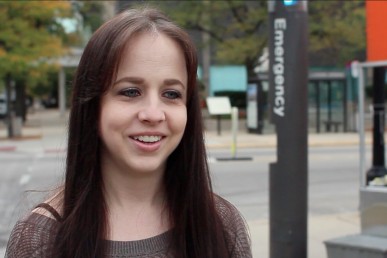Fruit cart returns with fresh choices for patients, staff
A fruit cart located outside the UI Hospital two years ago will return this summer — and organizers are starting a voucher program to bring fresh fruit to even more patients.
“We want to make sure patients have access to healthy food options at a reasonable cost,” said medical student Lauren Hughes.
The fruit cart project began in 2013, when Hughes worked with Neighbor Capital to sell affordable produce on a corner near the hospital.
“The first year went really well – patients and employees both frequented the cart,” said Hughes, a fourth-year student.
It’s scheduled to return in early June, stationed between the hospital and Outpatient Care Center. Hughes is raising money to begin a voucher program that would provide $1 worth of fresh fruit — enough for two items — to patients at the Outpatient Care Center.
She has raised more than $2,000 so far on the crowdsourcing site Indiegogo.com, with the goal of raising $5,000 by June 7.
She expects the Outpatient Care Center to hand out 900 vouchers per week for the five months the cart will be outside the hospital. “It’s a chance for UIC to show that we’re invested in our patients and helping them live a healthier lifestyle,” she said.
Hughes began the project with help from Patricia Finn, head of the department of medicine, and Stephen Brown, associate director of clinical practice and business development in emergency medicine.

“We want to make sure patients have access to healthy food options at a reasonable cost,” says medical student Lauren Hughes.
Brown connected Hughes with Neighbor Capital, which partners with Streetwise to provide jobs for people who were recently homeless or incarcerated. Graduates of the Streetwise Job Transitions Program work as vendors for Neighbor Capital’s fruit carts.
“There isn’t access to as many nutritious foods in the food deserts within our primary service area as there are in some other locations, like the suburbs,” Brown said. “Poor nutrition contributes to some of the elevated rates of chronic disease we see among our patient population.”
The cart will be stocked with about $300 worth of produce each day. “It almost always sells out,” Hughes said.
When patients pick up their produce, they can grab information on affordable healthy eating and exercise. Students in the College of Applied Health Sciences are creating material for a health education campaign, Brown said.
“What we are fighting is access to empty calories — the blue juice and red hots and the Happy Meal that costs $1,” he said. “They’re inexpensive but they contain a lot of the things we don’t want people eating in abundance.
“We want people to understand there’s a connection between their health and what they eat.”
